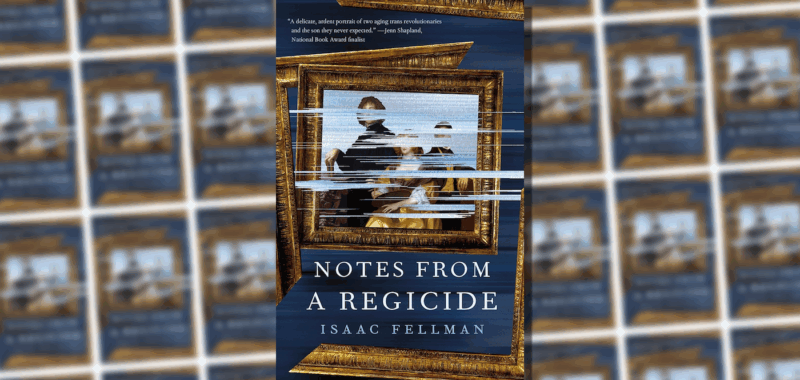Griffon Keming is a journalist of New York. Just not our New York…
Some things about his New York are different. His New York is a city some fifteen hundred years in the future from ours, long enough for the seas to have risen and fallen, for technology and medicine to have retreated to pre-electricity times. Some things are, unfortunately, familiar. Griffon is a trans man, disowned by his birth father over his gender identity, and transgender healthcare is still spotty, still restricted by psychiatric evaluations and restrictive notions of what men and women should be. And some things, like trans people finding one another, never change.
Griffon is adopted by Zaffre and Etoine Keming, a transgender couple of immigrant artists. They are eccentric, indulgent, injured; locked into routines and habits that verge on the self-destructive. But New York is only the end of their tale: Before they arrived, they were revolutionaries in the northern city-state of Stephensport. It was Zaffre who plotted to kill the prince of that place, and Etoine who did it.
Notes from a Regicide is both of those stories, wrapped into one. Griffon’s recollections of Etoine and Zaffre—from their first meeting, to their becoming his foster parents, to their deaths—are mixed with excerpts from Etoine’s prison diary, written while he waited to be executed for killing the prince.
Critically, these excerpts are new to Griffon as well. Though he knows his parents are from Stephensport, the place has always carried a mystical, unreal air to it. The city was (until the revolution) ruled over by thirty-two electors, revered as saints, preserved by an unknown cryo-technology that kept them from aging. Every time a prince died, the electors would wake to select a new one. The language of Stephensport is Portois, a blend of old French and English spoken nowhere else on the planet; the fashion has the bold colors and myriad layers of Renaissance fashion, and to anyone who asks about it they can only say “It was Stephensport. You wouldn’t understand.”
Buy the Book


Notes From a Regicide
Etoine’s diaries also reveal that he was a halfhearted revolutionary, at best: someone sucked along by events, rather than driving them. He’s much more concerned with matters closer to earth: coping with his alcoholism, discovering his love for Zaffre, and navigating his transition. Stephensport’s treatment of gender is rather like its government: ostensibly benevolent, but unwilling to change from what it thinks best. The city allows anyone to legally declare themselves a “sworn man” or “sworn woman” and be treated as such, but it has no legal methods for medical transition; one of the most unambiguous victories of Etoine’s journals is the moment he finally obtains testosterone and feels it remaking him as he wants to be.
Despite its title, Regicide is less so about revolution than about these intimate moments, laid bare. Isaac Fellman gives his characters a candor about their own messiness, dysfunction, and joy that most of us lack—but it never feels overdone, because everything he describes is so plainly true to life.
Early in the book, Griffon describes his embarrassment at how his parents behave in an art gallery. Being artists themselves, they jab and point and laugh at the paintings, make scenes about artists they like or dislike, and berate the guard who tells them off for getting too close. Griffon learns, he tells us, just to pretend he doesn’t know them. I read that passage, and then I had to put the book down for a moment, because—well, I’ve felt that way too. I’ve been embarrassed by people who are more enthusiastic than I am, cringed at what seem like overreactions or escalating minor conflicts. It’s not a charitable feeling, it’s not a nice feeling, but it’s a human feeling, and Fellman portrays it with deftness and charm.
The same authorial care is given to the experiences—shared in their broadest strokes among the three protagonists—of being trans. In one chapter ending that stuck with me, Etoine says it fits him like a national identity: “I belong to a totally different country. The GDP’s for shit, the medical care’s substandard, and everyone has always been at war with us, but we have the most beautiful women in the world and we’re not afraid of anything,” he says. “I’ll fight for that country.”
We know he means it, because Regicide shows every facet of what being trans means to him. It affects the way he dresses, gives him the distinctive “dandyish” style that Griffon finds so fascinating in New York; it affects the way he loves Zaffre, what feels right and wrong when their bodies are pressed together; it drives him towards the revolution, because its organizers are the only ones in Stephensport who will provide hormones. Sometimes it’s hard, and sometimes it’s weird—puberty at 50 does that!—but ultimately being trans is wonderful, and worth fighting for.
Stylistically, despite its far-future setting, Regicide is far more evocative of the revolutionary writings of the 1800s and early 1900s; even its title references the prison memoirs of Fyodor Dostoyevsky (Notes from a Dead House, published 1860-62) or Julius Fucik (Notes from the Gallows, published 1945). Its sentences are extended in the way so common to writers of that period, and their vocabulary—such as Etoine calling himself a “habitué” of a place—belongs to the 19th century. But this style is also where Regicide stumbled for me, because it doesn’t line up quite right with the book’s anchoring in contemporary queer identity.
What do I mean? I mean that Griffon and Etoine and Zaffre might live in the 30-something-th century that looks like the 19th century, but the way they think and talk of gender and sexuality is rooted in the 21st century. Griffon calls his birth father a homophobe and a transphobe, Zaffre refers to the estrogen she wants as “titty pills”—phrases that belong to the 1980s and later, and can’t help but look anachronistic on the page.
On the one hand: I get it! Old vocabulary is limited, inaccurate, and sometimes distasteful; in a book so emotionally and physically honest about being queer, straightforward modern terminology is a lot clearer and kinder. On the other hand, it’s unavoidably jarring to have Etoine Keming, a man who in every respect feels like a Gilded Age bohemian, call his wife a “pillow princess.” It’s a tension between the setting and the characters, and Regicide’s fault (of a sort) is that it loves its characters too much to fit them neatly into the setting it creates.
I can’t fault it for loving its characters, because by book’s end I did too. I don’t know if I could handle having Etoine and Zaffre as my own parents, but I feel now like I know them as I might some part of my family. Even if this “memoir” isn’t really that, there’s a lot that’s true in their stories of revolution and art and love.
Notes from a Regicide is published by Tor Books.
Read an excerpt.

